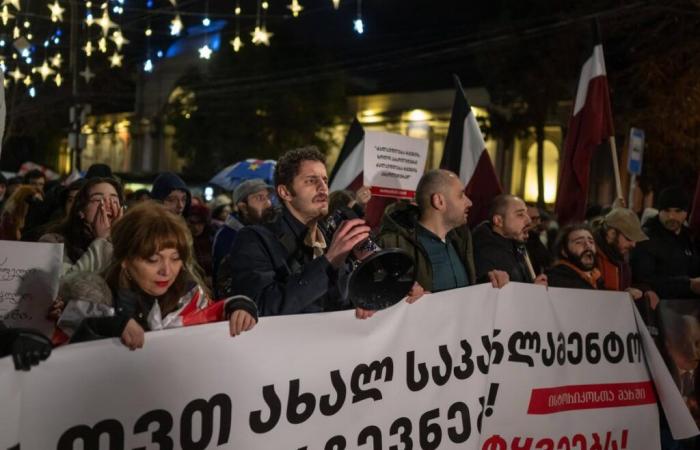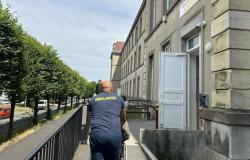A demonstration in Georgia, December 17, 2024. SOUP IMAGES/GIRL
Read later
Google News
Share
Facebook
Twitter
E-mail
Copy link
Send
Reading time: 2 min.
Free access
Georgia is preparing for the inauguration, Sunday, December 29, as president of a loyalist of the ruling party, but his appointment is contested by the outgoing leader and the pro-Western opposition, in a country in political crisis since the October legislative elections.
Also read
Reportage
“In the night of Tbilisi”: Emmanuel Carrère’s report in Georgia
Subscriber
Read later
Although the powers of the presidency are limited in Georgia, the arrival to this post of Mikheïl Kavelashvili, known for his ultraconservative and anti-Western positions, should spark a new mobilization of supporters of EU membership.
This Caucasian country has been shaken for weeks by large-scale pro-European demonstrations after the government's decision to postpone the objective of joining the EU until 2028. Critics of the government party, the Georgian Dream, also accuse him of having rigged the legislative elections of October 26, which he won.
Mikheïl Kavelashvili was designated as the new president on December 14 by an electoral college controlled by the Georgian Dream, even though the current occupant of the post, Salomé Zourabichvili, a former French diplomat who broke with the government and who supports the demonstrators, announced that she would refuse to surrender her mandate.
Also read
In Georgia, legislative elections seen as a choice between Russia and Europe
Free access
Read later
“There is only one formula to resolve such a crisis, a formula universally recognized in all democratic countries: new elections”she assured a few days ago in front of the demonstrators, after having declared “illegitimate” the October legislative elections.
The Georgian Dream for its part denies any fraud and accuses the opposition of wanting to provoke a revolution, according to it, financed from abroad. For the first time in Georgia's history, the president's swearing-in ceremony will take place behind closed doors in Parliament.
Several arrests
Prime Minister Irakli Kobakhidze assured that Salomé Zourabichvili's refusal to leave the presidential palace “would constitute a criminal offense punishable by many years of imprisonment”including for “anyone involved in such a scenario”.
He ruled out the organization of new elections, accusing his detractors of “liberal-fascism” and Brussels from ” blackmail “. The outgoing president appealed this week to the Georgian army, assuring them that it “will remain loyal” and that she “remains his commander in chief”.
During the first ten days of demonstrations in Tbilisi, the police dispersed the crowds with water cannons and tear gas. Protesters set off fireworks and threw stones and other objects at the police.
Also read
In Georgia, a fifth evening of pro-EU mobilization, thousands of demonstrators gathered in Tbilisi
Free access
Read later
More than 400 people were arrested, including opposition leaders, and dozens of police officers injured. Georgian Human Rights Commissioner Levan Ioseliani reported « tortures » of detainees by the police.
Last week, the United States and Britain imposed sanctions on several senior Georgian officials over the crackdown on pro-Western protesters.
Beyond the current crisis, the Georgian Dream is accused by its detractors of having abandoned its initial liberal and pro-European program in favor of an authoritarian drift playing into the hands of Russia. In power for more than ten years, this party adopted controversial laws this year inspired by the Russian legislative code, which target civil society and independent media and restrict the rights of LGBT+.
These measures had already triggered several weeks of massive anti-government demonstrations in the spring and led Brussels to freeze the accession process of this former Soviet republic to the EU.
By Le Nouvel Obs with AFP






